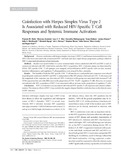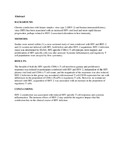| dc.contributor.author | Sheth, PM | |
| dc.contributor.author | Sunderji, S | |
| dc.contributor.author | Shin, LY, | |
| dc.contributor.author | Rebbapragada, A | |
| dc.contributor.author | Huibner, S | |
| dc.contributor.author | Kimani, J | |
| dc.contributor.author | Macdo nald, KS | |
| dc.contributor.author | Ngugi, Elizabeth N | |
| dc.contributor.author | Bwayo, JJ | |
| dc.contributor.author | Moses, S | |
| dc.contributor.author | Kovacs, C | |
| dc.contributor.author | Loutfy, M | |
| dc.contributor.author | Kaul, R | |
| dc.date.accessioned | 2013-06-29T10:52:54Z | |
| dc.date.available | 2013-06-29T10:52:54Z | |
| dc.date.issued | 2008 | |
| dc.identifier.citation | Sheth PM, Sunderji S, Shin LY, Rebbapragada A, Huibner S, Kimani J, Macdonald KS, Ngugi E, Bwayo JJ, Moses S, Kovacs C, Loutfy M, Kaul R.; Coinfection with herpes simplex virus type 2 is associated with reduced HIV-specific T cell responses and systemic immune activation.;J Infect Dis. 2008 May 15;197(10):1394-401. | en |
| dc.identifier.uri | http://www.ncbi.nlm.nih.gov/pubmed/18444797 | |
| dc.identifier.uri | http://erepository.uonbi.ac.ke:8080/xmlui/handle/123456789/42357 | |
| dc.description.abstract | BACKGROUND:
Chronic coinfection with herpes simplex virus type 2 (HSV-2) and human immunodeficiency virus (HIV) has been associated with an increased HIV viral load and more rapid disease progression, perhaps related to HSV-2-associated alterations in host immunity.
METHODS:
Studies were nested within (1) a cross-sectional study of men coinfected with HIV and HSV-2 and (2) women not infected with HIV, both before and after HSV-2 acquisition. HSV-2 infection status was determined by ELISA. HIV-specific CD8(+) T cell epitopes were mapped, and proliferation of HIV-specific cells was also assessed. Systemic inflammatory and regulatory T cell populations were assayed by flow cytometry.
RESULTS:
The breadth of both the HIV-specific CD8(+) T cell interferon-gamma and proliferative responses was reduced in participants coinfected with HIV and HSV-2, independent of the HIV plasma viral load and CD4(+) T cell count, and the magnitude of the responses was also reduced. HSV-2 infection in this group was associated with increased T cell CD38 expression but not with differences in the proportion of CD4(+) FoxP3(+) regulatory T cells. However, in women not infected with HIV, acquisition of HSV-2 was associated with an increase in the proportion of regulatory T cells.
CONCLUSIONS:
HSV-2 coinfection was associated with reduced HIV-specific T cell responses and systemic inflammation. The immune effects of HSV-2 may underlie the negative impact that this coinfection has on the clinical course of HIV infection | en |
| dc.language.iso | en | en |
| dc.publisher | University of Nairobi, | en |
| dc.title | Coinfection with herpes simplex virus type 2 is associated with reduced HIV-specific T cell responses and systemic immune activation. | en |
| dc.type | Article | en |
| local.publisher | College of Health Sciences, | en |


